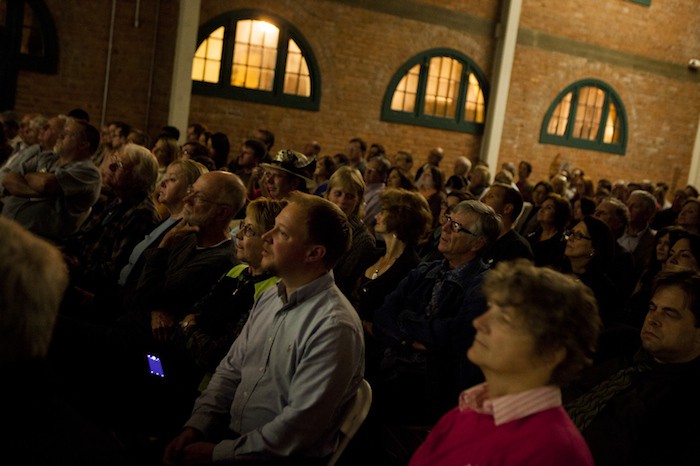
About 300 people filled an event space in San Diego a couple weeks ago to take part in a discussion sponsored by Voice of San Diego on innovations with origins in the area. The assembled crowd served as a physical representation of an amorphous concept that’s on the rise in nonprofit journalism: membership.
Every single person in attendance was a paid member of Voice of San Diego, with some of them having joined in order to attend the event. The following week, the site had to rent out an entire restaurant to fit all the members who would attend its monthly coffee talk.
News organizations have long tried to turn casual customers into regular ones. In newspapers, that meant turning an occasional single-copy buyer into a seven-day subscriber. For many online news sites, it means convincing occasional visitors to hand over their credit card info to get past a paywall. For nonprofits — dedicated to making their content freely available, but in need of stronger community connections — membership models are increasingly popular.
“Membership is the most important because I think it is the measure of whether you have a passionate following,” said Joel Kramer, CEO of the nonprofit MinnPost. “Because plunking down money is a great measure of people’s passion and intensity for what you do. Putting down money is a very good measure of intensity and the business models that are based on an intense following are generally more stable and more promising than models that are just based on a lot of traffic,” he said.
To further the membership model, the Knight Foundation has awarded Voice of San Diego and MinnPost a joint grant to improve how they attract and retain members as they become more established and look for new ways to grow. The Knight grant is for $1.2 million — $300,000 annually for two years for each organization — and is part of the Local Media Initiative Knight announced in January.The two news orgs will work together to improve their customer management systems that will allow MinnPost and Voice of San Diego to better manage how they deal with their members. They’ll then each work to better integrate membership data into their respective websites.
“[Voice of San Diego and MinnPost are] two organizations that have dynamic readership and who have kind of staked out a beachhead and have created a space where they both survived for several years,” said John Bracken, Knight’s director of journalism and media innovation. (MinnPost was founded in 2007 and Voice of San Diego launched in 2005.) “Now it’s sort of a matter of taking that initial progress and adding to it and not for just those two publications but for others in the space,” he said. (Disclosure: Knight is also a funder of Nieman Lab.)
The two organizations began working together in January with a common consultant. They’re transitioning to a system using Salesforce.com that will automate many tasks and streamline how each publication deals with attracting and retaining members.
“We’re building tools and systems so that we can really understand what’s going on with members and with prospects and be able to communicate with them in a targeted way, because we have good data and all our systems will be talking with each other,” said Kramer.
Both outlets want to make it easier for donors to give money repeatedly, and they want more information about each membership to be readily available to both the user and the organization. So, for instance, they’ll be able to tell if someone has donated recently and thus choose to leave them out of an email solicitation as to not overburden the donor.
The second phase of the grant will also work toward that goal and enable MinnPost and Voice of San Diego to better integrate membership information with each outlet’s website to utilize that data to increase users’ ability to customize the site and encourage membership.
Voice of San Diego CEO Scott Lewis said he wants the final product to feature “a very prominent and very user-friendly invitation to login, to select your preferences and the things you want to follow, and to follow our email newsletters,” as well as a way for members to detail their interests to better filter the VOSD content they most value.
Voice of San Diego runs WordPress and MinnPost is on Drupal, so they’ll each develop the second part of the project separately. But everything that is developed through the Knight grant will be open sourced, so other nonprofit news organizations will be able to take what Voice of San Diego and MinnPost develop and adapt it to their own unique needs.Both sites have seen membership grow in recent years, and as part of the Knight grant they’ve set goals to triple their totals over the next three years. Voice of San Diego’s membership grew 27 percent in 2013 to about 1,850 members, Lewis said. MinnPost finished 2013 with 2,226 members, an increase of 6 percent over 2012. Both publications hope increased membership will boost revenues and allow them to invest in improving their journalism. Voice of San Diego, which also plans to launch a capital campaign this year, plans to expand its geographic coverage area as well and redouble its efforts to cover topics like education, politics, and policy, and the economy.
“We’re a store that’s filled with people, but that has only one dysfunctional cash register,” Lewis said. “We need to make it as easy as possible for people to support things that they appreciate and support what they want to see happen. It’s not that easy right now, and it needs to be a lot easier. That’s what we’re hoping to fix.”